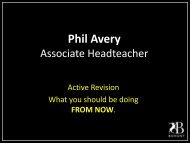Pathways Booklet 2012-14 final - Bohunt School
Pathways Booklet 2012-14 final - Bohunt School
Pathways Booklet 2012-14 final - Bohunt School
- No tags were found...
Create successful ePaper yourself
Turn your PDF publications into a flip-book with our unique Google optimized e-Paper software.
Onsite Provision<strong>Bohunt</strong> <strong>School</strong>4 | P a g e
1. 5 r-- - -r- - - -.- - - .-- - -,- - - -,- - - .--- - ----.r---,10.5o-0.5-1-1. 5-2 L....__-l.. .1.-.__---'- -'--__---'- -'--__--'-_-'o 200 400 600Fig. 1. Time series of Henon map80010001200<strong>14</strong>00The plot in Fig.I shows clear oscillations around a mean value, which appearsto remain constant throughout observation (stationarity). The oscillationshave various amplitudes and give no evidence of regularity.Fig.2 shows the results of a FFT (Fast Fourier Transform) of this timeseries. By this method, the signal is decomposed to harmonic oscillationsat different frequencies. The contribution of each individual wave to thesignal is measured by its power. The resulting power spectrum confirms thatthe frequencies of sine waves are not equally probable - waves of frequencyaround 300 and between 900 and 1000 (in units of the inverse sampling-time)are represented more prominently; still the power in between these frequencybands does not decrease significantly as it would in a quasiperiodic system.The autocorrelation of the time series decreases considerably after afew iterations of the Herron map. In order to reconstruct phase space withthe method of time delays, we chose as a rule of thumb the first minimumof the autocorrelation function as suitable. In our case a phase space wasreconstructed using a lag of 2. In two-dimensional phase space (Fig.3) thewell-known structure of the Henon attractor appears as expected [i.e. the reconstructionprocedure yields the same structure as in a phase space spannedby the analytical dimensions of the map given in (6)).The Grassberger-Proccacia method was applied with embedding dimensions! ~ m ~ 5 (FigA). Quite clearly slopes converge to a value of around1.25, which is consistent with the dimension 1.26 given in the literature.371
BTEC Performing Arts – Level 2<strong>Bohunt</strong> <strong>School</strong>OverviewThe Performing Arts contribute over £4 billion to the UK economy and employ about 84,000 people, so it’s a serious business. But it’s a tough one. Itis rare to succeed in the performing arts business based on creative talent and motivation alone. Determination, training and experience are key tosurviving in the industry and it’s here where a Performing Arts BTEC can really come into its own.Topics Covered Units for Year 1:More young people than ever are attracted to becoming actors, dancers, pop stars, managers and technicians. A BTEC in Performing Arts will givestudents the chance to show what they can do – and it could be the start of something big!The Performing Arts BTEC is a new and exciting qualification at <strong>Bohunt</strong>, which differs from the Drama GCSE as it consists of modules and you have thechance to broaden your experience in the second year. The BTEC should appeal to those students who perform more effectively under continualassessment, as opposed to one <strong>final</strong> exam.Performing Arts Production Process Students will put on their own fantastic performance, being responsible for everything from initial idea to first night.Understanding Drama This provides an overview to the exciting field of Drama, exploring both the theory behind drama and putting this into practice.Devising plays Students will create their own imaginative pieces devised from a range of stimulus material.Probable units for Year 2 (although students will have the option to broaden out into another area of Expressive Arts):The Performing Arts Business This unit aims to enable learners to gain awareness and knowledge of the fascinating basic business structure of the performing artsindustry, taking into consideration some of the range of administrative, technical, artistic and managerial areas current to the profession.Performing Scripted Plays Students will explore how to interpret a variety of interesting roles as written by a playwright.Acting Students will develop the skills necessary for developing confidence and understanding the role of an actor.AssessmentThe BTEC is equivalent to four GCSEs and is already recognised by colleges as such. The BTEC Performing Arts course is perfect for students wishing tocontinue with Drama at college and provides a good foundation for students intending to work in the Performing Arts industry.NB: Equivalency is being reviewed by the Department of Education at the time of printing and may be subject to change.6 | P a g e
BTEC Travel & Tourism – Level 2<strong>Bohunt</strong> <strong>School</strong>OverviewTravel, Tourism and Leisure is now one of the world’s most important industries. The UK economy alone earns over £80 billion every year fromtourism and leisure. The tourism industry is, therefore, one of the greatest providers of employment and income for many countries.The BTEC Travel and Tourism course has been developed to focus on:education and training for Travel and Tourism employeesallowing students to achieve a nationally recognised qualificationproviding the qualification to enter employment in travel and tourism or to progress to higher vocational coursesContinuing to develop a range of key skills essential for successful performance in working life eg identifying a problem and planning waysof solving the problem.Topics CoveredLearners will study three core units:The UK Travel and Tourism Industry. This includes, for example:o Why people travelo Growth of package holidayso Transport developmentsExploring Customer Service in Travel and Tourism. This includes for example:o Different types of customerso Communication methods and skillso Ways of measuring customer serviceUK Travel and Tourism destinations. This includes for example:o Knowing how to use sources of informationo Planning holidays in the UKLearners will also study 3 specialist units from the list below:o European Holiday Destinationso Exploring marketing in Travel and Tourismo Business skills for Travel and Tourismo Developing Employment Skillso Planning visits for Travel and Tourism8 | P a g e
AssessmentThe BTEC First Diploma counts as 4 GCSEs, A* - CBTEC First Diploma GradePassMeritDistinctionDistinction*GCSE Grade Equivalent4 ‘C’ Grades4 ‘B’ Grades4 ‘A’ Grades4 ‘A*’ GradesStudents will have an assessment for each of the units of work. They must pass each unit to obtain the qualificationNB: Equivalency is being reviewed by the Department of Education at the time of printing and may be subject to change.9 | P a g e
Government and the UK economyGlobalisation and UK businessAssessmentControlled Assessment 25% of the total GCSE marksStudents select one of the two Controlled Assessment tasks made available by OCR. Students submit one Controlled Assessment task in the form ofa report. The report should comprise the three investigations for assessment. This is internally assessed and externally moderated.Written exam 25% of the total GCSE marksThis is a 1 hour written paper This question paper consists of two compulsory short-answer, data-response questions. Students answer bothquestions. This unit is externally assessed.Written exam 50% of the total GCSE Marks.This 1 hr 30 mins written question paper consists of three compulsory questions based on the pre-released case study stimulus material. The prereleasedcase-study stimulus material is made available by OCR. A clean copy of the case study will be issued to students with the question paper.Students answer all three questions. This unit is externally assessed.This scheme of assessment is un-tiered, covering all of the ability range grades from A* to G.Students achieving less than the minimum mark for Grade G will be ungraded.There are two examination series each year, in January and June.11 | P a g e
Computing (Computer Science)Overview<strong>Bohunt</strong> <strong>School</strong>The computer science GCSE will give learners a real, in-depth understanding of how computer technology works. Learners will no doubt be familiarwith the use of computers and other related technology from their other subjects and elsewhere. However, the course will give them an insight intowhat goes on ‘behind the scenes’, including computer programming, which many learners find absorbing.The course provides excellent preparation higher study and employment in the field of Computer Science. The increasing importance of informationtechnologies means there will be a growing demand for professionals who are qualified in this area. Learners who’ve taken a GCSE in Computing andwho then progress to study the subject at A Level or university will have an advantage over their colleagues who are picking up the subject at theselevels.The course will develop critical thinking, analysis and problem-solving skills through the study of computer programming. For many learners, it’ll be afun and interesting way to develop these skills, which can be transferred to other subjects and even applied in day-to-day life. In this respect, thecourse will make an excellent preparation for learners who want to study or work in areas that rely on these skills, especially where they are applied.Topics Covered Year 10Computer Systems and ProgrammingComputer SystemsCentral Processor Unit (CPU)Binary LogicMemoryInputs/OutputsStorageNetworksRelational DatabasesProgramming LanguagesAssessment Year 10Investigative TaskControlled Assessment 40 hours 30%Year 11Computer Systems and ProgrammingThe InternetSoftwareDataControlData HandlingProgrammingControlAlgorithmsSound and ImagesYear 11Computer Systems and ProgrammingExam 1 1 / 2 hours 40%Programming TaskControlled Assessment 40 hours 30%12 | P a g e
CoPE – Level 1 or 2<strong>Bohunt</strong> <strong>School</strong>OverviewThe Certificate of Personal Effectiveness (CoPE) offers an imaginative way of accrediting young people’s activities. It allows learners the opportunityto record a wide range of personal qualities, abilities and achievements as well as introducing them to new activities and challenges.Students build up a portfolio of evidence as they complete the challenges and gain “credits” for each finished module.The course offers the opportunity to include activities both inside and outside of school. It offers regular recognition and reward as each completedcredit is certificated.Topics CoveredThere are 12 modules:1. Communication2. Citizenship and Community3. Sport and Leisure4. Independent Living5. The Environment6. Vocational Preparation7. Health and Fitness8. Work Related Learning and Enterprise9. Science and Technology10. International Links11. Expressive Arts12. Beliefs and ValuesEach of these modules is divided into three sections. Each section is designed to take about 10 hours and is worth one credit. 12 credits have to becompleted to achieve the CoPE.(Unit certificates are available where full qualification is not achieved.)AssessmentTo achieve the ASDAN CoPE students must gain credits by completing challenges and providing evidence to demonstrate skill development at theappropriate level. Students need to:complete challenges to achieve the required number of credits (12 for the full award). These are listed below.action plan, record achievements and review progress with a tutorcomplete the assessment checklist, which cross references evidence to meet the requirements of the qualification13 | P a g e
present an organised portfolio of evidence from the challenges, and provide at least one example of working at the level set, from eachof the units: Working with Others, Improving own Learning & Performance, Problem Solving, Research, Discussion, Oral Presentation.The ASDAN Certificate of Personal Effectiveness is a nationally recognised qualification. It is approved by QCA, ACCAC and CCEA.The qualification is awarded at two Levels.Level 1 is equivalent to a GCSE Grade E/F.Level 2 is equivalent to a GCSE Grade B.<strong>14</strong> | P a g e
DanceOverview<strong>Bohunt</strong> <strong>School</strong>If you love to dance then this is the course for you. If you dance outside of school then you will gather more skills in choreography and have thefreedom to explore your styles and develop these further. It gives you an insight into professional dance companies and roles within these as youform your own dance company. In addition to helping students acquire subject knowledge, the dance GCSE:promotes fitness, a healthy lifestyle, team working and creativityactively engages students in the process of dance in order to develop as effective and independent learners and as critical and reflectivethinkers with enquiring mindsdevelops students' skills, knowledge and understanding of a range of dance styles through the interrelated processes of performing, creatingand appreciating dancesdevelops physical, technical and expressive skills through which students are able to communicate choreographic intention and develop theirindividual qualities as performersdevelops students' skills, knowledge and understanding of choreography through which they are able to communicate ideas, thoughts andmeaning drawn from a range of dance stylesdevelops a critical appreciation of dance in its physical, artistic, aesthetic and cultural contextsTopics CoveredCreating dances – Choreographic techniquesPerformanceFitness and nutritionSafe dance practiceDifferent styles of danceAspects of productionRehearsal planningStudying professional worksLive Theatre tripsWorkshops with professional dance companiesAssessmentThe Dance GCSE consists of the following four units:Unit 1: Critical Appreciation of DanceWritten Paper – 1 hour50 marks – 20%Unit 2: Set Dance15 | P a g e
Practical Examination: Solo Performance – 1–1½ minutes30 marks – 20%Unit 3: Performance in a duo/group dance 3 – 3½ minutesControlled Assessment30 marks – 20%Unit 4: ChoreographyTask 1: Solo Composition 1–1½ mins: 20 marks – 15%Task 2: Choreography – solo/duo/group: 40 marks – 25%Unit total: 60 marks – 40%16 | P a g e
Design & Technology - Resistant Materials<strong>Bohunt</strong> <strong>School</strong>OverviewTopics CoveredResistant Materials covers a wide range of activities based on designing and making products that are manufactured using materials such as wood,metal and plastics. As well as learning hand skills, students will use a range of industrial processes to shape and form materials into functioningproducts. Over the course of two years students will develop a whole range of creative designing and making skills, technical knowledge andunderstanding related to RM and invaluable transferable skills such as problem solving and time management.During year 10 and 11 students will undertake a mixture of short and extended written/design and practical tasks, the aim of which is to increase thestudents’ knowledge of the Design Process, and enable them to produce a range of high quality itemsStudents willAnalyse existing productsDevelop the practical skills learnt in KS3 by producing quality practical workConsider aesthetic, technical, economic, environmental, ethical and social aspectsLearn how to use CAD and CAM equipmentStudy the work of influential designers and their impactDevelop knowledge and understanding of a wide range of materials, processes and industrial practices by producing a range of qualitypractical itemsConsider how to make a quantity of quality productsCarry out Risk Assessments to ensure they are working safelyLearn to plan the correct order in which to produce their individualised workEvaluate their own outcomes and the work of others, and learn from the processAssessmentThe course will be assessed by:One design and make coursework activity, taking about 40 hours. This is worth 60% of the <strong>final</strong> gradeOne 90 minute, single tier exam, based on Knowledge and Understanding of the subject. This includes multiple choice, short answer andextended writing/design questions.17 | P a g e
English Language and Literature<strong>Bohunt</strong> <strong>School</strong>Overview:Topics Covered:Assessment:Throughout the two year course, students will be taught writing, reading, speaking and listening skills to produce written work and oral work in avariety of different styles and for a range of different audiences. This will include creative writing such as stories, scripts and poems, and non-fictiontexts such as letters, articles, speeches or advice sheets. Students will be required to read and respond in writing and in discussion to a variety ofdifferent texts and media such as documentaries, films, advertisements, newspapers and magazines, as well as works of literature including worksfrom the English Literary Heritage, a Shakespeare play, a modern play and/or novel and a range of poetry from the published Anthology. They willalso be expected to study a novel which reflects the cultural diversity of our society.Students will prepare for either one GCSE in English, or two GCSEs in English Language and English Literature. Assessment will be via a combinationof controlled assessment tasks (CATs) completed in school at selected points throughout the course under close teacher supervision, and externallyassessed examinations. Examinations take place in January and June and as a general rule, Controlled Assessments will take place each half termduring Year 10.EnglishUnit One, Understanding and Producing non-fiction texts (External Examination)This is worth 40% of the <strong>final</strong> grade. It is assessed by an examination where students answer questions on unseen non-fiction reading sources andproduce two texts of their own.Unit Two Speaking and ListeningThis is worth 20% of the <strong>final</strong> marks. Students are assessed on three equally weighted activities: presenting, discussing and listening and role playing.Unit Three Understanding and Producing Creative Texts (CATs)This element is worth up to 40% of the <strong>final</strong> grade. It is assessed under controlled conditions in school.Part a: Understanding Creative Texts (literary reading) – candidates choose one or more tasks from the Controlled Assessment Bank of publishedtitles for the year in which they are entering this unit. They must write about their study of literary texts, drawing on a play by Shakespeare, a textfrom the English Literary Heritage and a text from a different culture.Part b: Producing Creative Texts – candidates choose two tasks from the bank of published titles for the year in which they are entering this unit.19 | P a g e
English LanguageUnits One and Two are assessed in the same way as English.Unit Three is assessed by Controlled Assessment (CAT) and is worth up to 40% of the total GCSE marksPart a: Extended Reading 15% of the total GCSE marks. Students study a modern play or novel from a list prescribed by the examination board. It maybe the same text as one they are also studying for their Literature examination.Part b: Creative Writing 15% of the total GCSE marksPart c: Spoken Language Study 10% of the total GCSE marks.English LiteratureUnit One Exploring Modern Texts - 40% of the marks assessed by external examination.Section A Modern Prose or DramaSection B Exploring CulturesUnit Two Poetry Across Time - 35% of the marks assessed by external examinationSection A Poetry cluster from the AnthologySection B Responding to an unseen poemUnit Three The Significance of Shakespeare and The Literary HeritageCAT worth 25% of the total marks.20 | P a g e
Food Technology<strong>Bohunt</strong> <strong>School</strong>OverviewStudents will design and produce a range of dishes/meals to suit a range of different needs. They will learn a range of skills, and use a range ofequipment.Topics CoveredDuring year 10 and 11 students will undertake a range of short and extended written/design and practical tasks, the aim of which is to increase thestudents’ knowledge of the Design Process, and enable them to produce a range of high quality Food products.Students will Understand the use and purpose of different ingredients in dishes Understand the Nutritional properties of food. Understand how different ingredients react together Consider Market Influences on dishes and ingredients Understand different processes involved in manufacture Use a range of equipment, and learn a range of skills Understand Health and Safety Principles involved in Food productionAssessmentThe course will be assessed by:One design and make coursework activity, taking about 45 hours. This is worth 60% of the <strong>final</strong> gradeOne 120 minute single tier exam, based on Knowledge and Understanding of the subject. A theme will be released before this exam to enabletargeted revision.21 | P a g e
Geography<strong>Bohunt</strong> <strong>School</strong>Overview Geography explains the past, illuminates the present and prepares us for the future. What can be more important than that? (Michael Palin –President of the Royal Geographical Society)Students at <strong>Bohunt</strong> study the AQA A syllabus; this aims to highlight the critical importance of Geography in understanding the world and stimulatinginterest in places. It will inspire students to become global citizens by exploring their place in the world, their values and responsibilities to otherpeople and the environment.Topics CoveredStudents will study three main areas.Human Geography – 37.5%Physical Geography – 37.5%Controlled Assignment – 25%Unit One Human Geography has three areas of study.Changing Urban EnvironmentsThe Development GapTourismUnit Two physical geography is split into three main areas.The Restless EarthThe Coastal ZoneRocks and the LandscapeAssessmentThe <strong>final</strong> exam will be in the summer term of Year 11 for both units.The controlled assignment will be a local area study based on a question set by the exam board. This question will be completed in the spring termof year 1022 | P a g e
To achieve the GCSE a wide variety of resources and teaching styles are used to introduce students to the world around them. Young geographerscan expect to work independently and in teams to further their learning. Students learn to observe and comment on images and data to drawcritical conclusions from the information they are taught. Geography provides an ideal framework for relating other fields of knowledge. It is notsurprising that those trained as geographers often contribute substantially to the applied management of resources, environments and people.Students at <strong>Bohunt</strong> are given a number of fieldwork opportunities to allow them to explore the spaces and places around them, students whochoose a geographical pathway have the opportunity to take part in a residential trip to Swanage in Dorset to look at coastal landscapes andprocesses as well as local area studies in Liphook and Portsmouth. Overseas fieldwork opportunities have included a tour of South Iceland to look atTectonics and Glaciers and a Tour around the Bay of Naples looking at Tectonic activity.23 | P a g e
HistoryOverview<strong>Bohunt</strong> <strong>School</strong>The study of history at GCSE allows students the opportunity to gain knowledge and understanding of the past, as well as developing important lifeskills, such as research, analysis and debate. The students will investigate events, people, changes and issues and will evaluate a range of historicalsources, such as pictures, cartoons, film footage, letters, and parish records.The course encourages students to form and express their own opinions.Topics CoveredThere are three main areas of study:History Around Us focuses on a personal investigation of a local history site in Liphook. Students are encouraged to work in teams, observe,photograph, and then use original documents to develop their own conclusions. Students have the opportunity to relate their investigation of thesite to the wider context of changes in British History.Study in Depth looks at issues, events and people in Germany in the period of 1919 to 1945. Students investigate the developments and conditionsin Weimar Germany as a way of explaining the rise to power of Hitler and the Nazi party.Study in Development looks at trends, changes in Medicine from the prehistoric times to the present day as well as focus on developments in publichealth in Britain.Assessment Controlled Assessment 25% Written examination 75%All year 10 students take an examination in Medicine Through TimeAll History students sit Germany examination in Year 11.Coursework:History Around Us 25%-A coursework assignment of 1,200 to 1,700 words. Students are encouraged to include photographs, sketches and show they have used originaldocuments to explain the development of their chosen site in LiphookExamination:Study in Development 37.5% Medicine Through Time Year 10Study in Depth 37.5% Germany 1919 – 45 Year 1124 | P a g e
RHS Horticulture –Level 1 & Level 2<strong>Bohunt</strong> <strong>School</strong>OverviewRoyal Horticultural Society Level 1 Award and Level 2 Certificate in Practical HorticultureThe RHS Level 1 Award and Level 2 Certificate are provided by the Royal Horticultural Society and delivered in conjunction with Sparsholt College.Students are assessed through practical tasks and are expected to achieve level 1 in the first year and complete level 2 in the second.The course is suitable for student who may be looking at an outdoor career or for those just interested in the living environment.Topics CoveredAssessmentStudents are taught a wide range of practical horticultural tasks. They are expected to master a variety of skills using horticultural tools andequipment. Learning takes place within the school horticultural area and locations around the school site. Students will be growing fruit andvegetables as well as maintaining ornamental areas of the school. Plant reproduction is covered including propagation by seed and cuttings.Students are also expected to be able to identify and name a variety of different species and plants.Level 1 assessmentsPreparing soil for sowing and plantingSoil TestingAssist with the propagation of plants for seedAssist with the vegetative propagation of plantsAssist with planting and establishing plantsIdentification of a range of common garden plants, weeds,pests and diseasesLevel 2 assessmentsSustainable garden practiceSowing seeds and vegetative propagation techniquesPractical skills in ground preparation for seeding and plantingPractical skills in establishing seeds and plants in soilCare and pruning of plantsIdentification of a range of common garden plants, weeds, pests, diseases,disorders and beneficial organismsNB: Equivalency is being reviewed by the Department of Education at the time of printing and may be subject to change.25 | P a g e
ICTOverview<strong>Bohunt</strong> <strong>School</strong>The ICT GCSE offers students an exciting opportunity to develop their ICT skills whilst designing and producing their own publications andinteractive digital products. ICT is an integral part of modern society and is growing every year.. The GCSE ICT GCSE allows students to gain andexpand their knowledge and understanding into how ICT impacts everyday home and work life. They will develop their IT skills whilst learning tocritically reflect; in addition it encourages creativity, innovative thinking and independence.Students investigate topics that range from gaming, computing, digital television and animation through to robotics, computer networks, mobiledevices and emerging technologies.The GCSE is assessed through 60% coursework over the duration of the course and one exam in Year 11 worth 40%.Topics CoveredUnit 1: Living in a Digital WorldCurrent and emerging digital technologiesPersonal digital devicesMobile DevicesGamingImpact of ICTOperating OnlineLeisure & shoppingHealth and well-beingRisks and securityControlUnit 2: Using Digital ToolsIn this engaging unit, students put into practice what they learned about digital technology in Unit 1. Students broaden and enhance theirICT skills and capability. Working with a range of digital tools and techniques students will produce effective ICT solutions in a range ofcontexts. Students learn to reflect critically on their own and others’ use of ICT and to adopt safe, secure and responsible practice.AssessmentUnit 1: Living in a Digital WorldExam 1 1 / 2 hours 40%Unit 2: Using Digital ToolsControlled Assessment 40 hours 60%26 | P a g e
iGCSE in Global Perspectives (by invitation only dependent on academic achievement)<strong>Bohunt</strong> <strong>School</strong>Overview This option is available to able students who will have achieved a Level 7c in English by the end of Year 9.The International GCSE (iGCSE) in Global Perspectives develops independent thinking, learning and communication skills. It focuses on issues relevantto today’s learners and helps them shape their world perspective by connecting learning with real-world issues. The course is only offered to ourmost able learners as the reading, discussion, ways of working and examination methods are challenging.The course is built around a series of topics, each containing issues of global importance. The topics provide a meaningful and stimulating context inwhich learners can begin to develop the skills they need as active, global citizens and for practical application in further study. The emphasis is onthinking critically about issues where there is always more than one point of view. This means that, as well as understanding their own views on atopic, students will also need to understand the views of others in the same class, throughout the country and across the globe through research,interaction and the exchange of information and ideas. Outcomes of their studies could be as diverse as writing to the United Nations about climatechange, organising a school workshop on the importance of water to different societies, introducing a school-wide Fair Trade policy or even meetinggovernment ministers.Topics CoveredTeachers and learners can explore a range of different global topics. Choices include:Belief systemsBiodiversity and ecosystem lossClimate changeConflict and peaceDisease and healthEducation for allEmploymentFamily and demographic changeFuel and energyHumans and other speciesLanguage and communicationLaw and criminalityPoverty and inequalitySport and leisureTechnology and the economic divideTrade and aidTradition, culture and identityTransport and infrastructureUrbanisationWater, food and agricultureAssessmentIndividual ResearchCandidates carry out research based on two topic areas and submit an Individual Research report on each topic.Group ProjectGroup Element: Candidates collaborate to produce a plan and carry out a group project based on research into one topic area (the group outputcomprises 33% of this section of assessment, 10% of the students overall grade). The topic must be different from the topics studied for the27 | P a g e
Individual Research.Individual Element: Candidates evaluate the plan, process and outcome of the group project as well as their individual contributions to the project.Candidates report on what they have learnt from the cross-culture collaborations.Written Paper, 1hr 15min: This consists of compulsory questions based on a range of sources provided with the paper. Sources will present globalissues from a range of perspectives.Weighting:Individual Research: 40%Group Project: 30%Written Paper: 30%Nature of Assessment:Individual Research:Internal, IndividualGroup Project: Internal, Group 33% & Individual 67%Written Paper:External, Individual28 | P a g e
Languages: French, German, Japanese, Mandarin, Russian & Spanish<strong>Bohunt</strong> <strong>School</strong>OverviewTopics CoveredAssessmentStudents may study GCSE French, German, Spanish, Japanese, Mandarin, or Russian. For French, German and Spanish we have foreign languageassistants as well as class teachers, to work flexibly with small groups. This is especially important to help students improve their speaking skills andconfidence. Students opting for Russian, Japanese or Mandarin will also study the language in one option block, giving them six lessons each week.This is necessary to develop sufficient fluency, to succeed with these languages that use a different alphabet, as they are begun from scratch in year10.GCSEs cover the following topics in each language; tourism, coping with problems abroad, eating out, finding the way, personal identification, freetime, sports and leisure, school life, health and welfare, some current affairs/ issues such as caring for the environment, fashion and music.Assessment at GCSE is divided into four skills. Listening for understanding and reading for understanding each count for 20% on <strong>final</strong> papers, whichare sat in May of Year 11 at foundation or higher level. 30% of the mark comes from controlled writing assessments completed over the 2 yearcourse. Speaking is assessed in a similar way and also counts for 30% of the total.29 | P a g e
MathsOverviewTopics CoveredAssessment<strong>Bohunt</strong> <strong>School</strong>Mathematics is a core subject at GCSE. All students will be following the Edexcel Linear Course at either the Higher or the Foundation tier. The Highertier allows students to achieve up to an A* grade while students can achieve a C grade on the Foundation tier. There is no coursework in theMathematics GCSE.The Mathematics GCSE covers a wide range of topics within the six areas of Number, Algebra, Statistics, Probability, Geometry and Measures. Thetopics are broadly the same at the two tiers but are studied at different levels of difficulty.Students will take two examinations in the summer term of Year 11. Each examination is worth 50% of the total GCSE. One is a non-calculatorexamination while the other requires a calculator. Approximately 30% of each paper is made up of the functional elements of Mathematics.Students will also complete regular assessments in class as well as mock examinations to ensure that they are making appropriate progress and areplaced in the correct ability group.30 | P a g e
Maths Statistics & Additional Maths (by invitation only dependent on academic achievement)<strong>Bohunt</strong> <strong>School</strong>Overview This option is available to able Mathematicians who will have achieved a Level 8 in Maths by the end of Year 9.Topics CoveredAssessmentOverviewTopics CoveredAssessmentGCSE Statistics (Edexcel)This qualification complements and extends the content of the GCSE in Mathematics which is taken by all students.The course emphasises the theoretical, practical and applied nature of the subject and provides an excellent background for the study of Statisticsbeyond GCSE level.Assessment: 25% controlled assessment, 75% <strong>final</strong> examinationFSMQ Additional Maths (OCR)This course provides excellent preparation for the mathematics studied in AS and A Level Mathematics. It is suitable for students who are expected toachieve a very high grade at GCSE.The content consists of four areas of Pure Mathematics:• Algebra• Co-ordinate Geometry• Trigonometry• CalculusEach of these is used to support a topic from a recognised branch of Applied MathematicsAssessment: 100% <strong>final</strong> examinationThese two qualifications would be offered as an option and would result in students gaining a full GCSE in Statistics and the equivalent of ⅔ of aGCSE in Additional Maths.31 | P a g e
Media Studies<strong>Bohunt</strong> <strong>School</strong>OverviewTopics CoveredThe mass media is the major force in society behind the communication of information and the provision of entertainment in today’s society. It isalso arguably the most important factor in shaping people’s beliefs and attitudes. GCSE Media sets out to unravel the different strands thatcontribute to the media and to enable students to gain a critical understanding of these varied elements.The course explores and evaluates not only the media product itself, but also its means of production, the underlying commercial and industrialforces, and the crucial importance of different audiences. Over the course each class will study at least four topic areas drawn from:32 | P a g eTVFilmRadioNewspapersMagazines and comicsPopular musicIn each case the students must demonstrate a critical awareness of the types of media language employed the influence of institutions, the natureof representation and the intended and actual audience.Assessment Assessment is made up of 40% coursework and 60% a Controlled Test at the end of Year 11Coursework2 assignments taking place under controlled conditions will support a practical piece of media work. This may include creating a movieposter, designing a CD cover, writing a magazine article or designing the sounds effects for a scene from a movie.1 practical project. Each student will be directly involved in creating a major project. This will most often be in the form of conceiving,planning, shooting and editing a very short film.Controlled TestStudents will be given the test paper in advance of the <strong>final</strong> exam. This will facilitate the research and planning of successful answers for the threetasks. The <strong>final</strong> test will last 1½ hours.Recent Test Topics:• 2007 The Music Press, 2008 Sitcoms, 2009 Quiz Shows, 2010 The Popular Press, 2011 Action Adventure Movies
Music<strong>Bohunt</strong> <strong>School</strong>Topics CoveredAssessment and Qualification Alliance (AQA)provides students the opportunity to gain self-confidence through performing to othersdevelops team-working skills through performing with othersextends creative skills through composing musicencourages the understanding of the importance of continuous evaluation and refinement in any processprovides a solid foundation for progression to music related courses, including A-level Music, and a career in music professions.Important: Students will be expected to be able to understand notation suitable to the occasion, including staff notation by the end of the course.It is compulsory that students have lessons on their chosen instrument throughout the two years of Music GCSE.Musical Elements in relation to all styles of musicRhythm & MetreHarmony & TonalityTexture & MelodyTimbre & DynamicsStructure & FormStyles of Music studied:The Western Classical TraditionBaroque orchestral musicThe concertoMusic for voicesChamber musicThe sonataPopular Music of the 20th & 21st centuriesBluesPopular music of the 1960sRock music, R’n’B (Rhythm and Bass), Hip-HopMusic TheatreFilm music33 | P a g e
World MusicMusic of the CaribbeanMusic of AfricaMusic of IndiaAssessmentThe music GCSE consists of the following four units:Unit 1: Listening to and Appraising MusicWritten Paper – 1 hour – 80 marks – 20%Unit 2: Composing and Appraising MusicExternally assessed – 40 marks – 20%Unit 3: Performing MusicControlled Assessment – 60 marks – 40%Unit 4: Composing MusicControlled Assessment – 30 marks – 20%34 | P a g e
PE CORE<strong>Bohunt</strong> <strong>School</strong>OverviewThis is a non-examination course.Students will have the opportunity to choose to follow one “Pathway” throughout Year 10 and 11. <strong>Pathways</strong> include Sports Leaders options leadingto Sports Leaders Level 2 Award, Performance Pathway, Recreation and Leisure, Gymnastics and Dance Leading to Dance Leaders Award and Healthand FitnessTopics CoveredThe course operates on a six week module basis and the current Year 10 / Year 11 course has included the following modules.-Badminton, Fitness Room, Gymnastics, Hockey, Athletics, Rounder’s, Games Choice.Golf, Swimming and Orienteering are currently offered as optional off-site activities.35 | P a g e
PE GCSE<strong>Bohunt</strong> <strong>School</strong>OverviewAssessmentHealthy and Active BodyExercise and TrainingSkill AcquisitionOpportunities and <strong>Pathways</strong> for InvolvementTwo written papers will be common to all candidates and the theoretical ability will be tested by questions having an incline of difficulty.Practical Coursework (60%)Candidates are required to offer FOUR activities for periodic coursework assessment. The four activities must be selected from at least three of thesix National Curriculum Areas of Activity. These are Games, Gymnastic Activities, Dance, Athletic Activities, Outdoor & Adventurous Activities,Swimming and Exercise Activities.All candidates will complete two controlled Assessment Tasks:One will be an Analysing Performance task and one will be an Analysing Lifestyles task.From 2010 candidates will be able to offer both Coaching and Officiating in an activity for assessment. Further details on this are available from thePE Department.More information on specific sports and activities which can be assessed is available from the PE department.Students will be expected to wear the correct school kit for all practical activities36 | P a g e
Philosophy & Ethics (AS) (by invitation only dependent on academic achievement)<strong>Bohunt</strong> <strong>School</strong>Overview This option is available to able students who will have achieved a Level 7c in English by the end of Year 9.Oxford Cambridge and RSA Examination‘Philosophy and Ethics’ is offered at AS-level to year 10 students. The course is spread over two years and count towards student’s A-levels. Thesubject will be taught in normal lesson time by Mr Ostersen.We are looking for students, who are aiming for Oxford and Cambridge as an option for a preferred university. Applicants must be driven, selfmotivatedand must have been able to live up to their target grades.We are running this course for the fifth year running, and we have a proven track record of success with the course.Topics CoveredCourse ContentStudents will be introduced to the major influences on Philosophy of religion and Ethical Theory.Topics covered:Philosophy (Philosophy of Religion)• Plato, the Analogy of the cave and forms• Aristotle and his view of forms and the Prime mover• God the Creator seen from a Christian Perspective• The goodness of God; How is God described?• Arguments for the existence of God such as the Ontologicalargument, The design Argument, The cosmological argument andthe Moral argument with criticisms.• Theodicies from Augustine and Irenaeus as to why evil existsdespite God being good.Ethics (Ethical Theory)• Absolutism vs. Relativism• Utilitarianism• Natural Law• Immanual Kant• How do Catholics and Protestants take ethical decisions?• Above theories will be applied to:• Abortion, Euthanasia, Medical ethics, and war and peace.The lessons will be conference-styled where all views are welcome. In addition we will make use of games, student presentations, role-plays andfilms. All homework will be exam relevant.AssessmentNo Coursework.Examined yearly:1st Year:One examJune Exam – Philosophy of Religion2nd Year:One examJune Exam – Ethical Theory37 | P a g e
PhotographyTopics Covered<strong>Bohunt</strong> <strong>School</strong>Coursework will comprise of a minimum of one in depth unit of work (research, ideas, development and <strong>final</strong> piece) and a portfolio of examples ofstudents’ practical work in a wide variety of styles. This is 60% of their <strong>final</strong> mark.Description:During the course students will be taught how to use a professional camera and how to take a good photograph! Photoshop Elements is used to editphotos and they will also be taught about a variety of photographic genres. Students will get the opportunity to take photographs in a variety ofcontexts including studio photography, outdoor locations, imaginative set ups and live events photography.Students will have the opportunity to go out on location and to visit a photography exhibition during the 2 year course.All work will be created in Word and it will be presented in a ring binder folder that students will need to provide for themselves.It is recommended that students have a memory stick so that they can bring their photographs in and take their work home to back it up.Students will be expected to make a contribution to the colour printing costs of their documents.It would be useful for students to have the use of a camera at home.All <strong>final</strong> pieces (photographs) that the school print out will belong to the school. Students can of course get their work printed out for themselvesoutside of school.Homework requirements:Homework is set regularly and this could be research or practical. It is expected that students will spend a minimum of 2 hours per week on theirPhotography homework.AssessmentCoursework is assessed regularly and students are given the opportunity to improve their work.Exam requirements:The <strong>final</strong> exam (40%) is very similar to a piece of coursework. Students will be given a minimum of 6 weeks to prepare for the <strong>final</strong> piece. The onlydifference between coursework and the exam is that the <strong>final</strong> piece has to be completed under supervised conditions in 10 hours.38 | P a g e
PSRE CoreOverview:Topics Covered:<strong>Bohunt</strong> <strong>School</strong>Personal, Social and Religious Education (PSRE) is a compulsory course for all students and will extend the work of Key Stage 3 PSE as well as deliverstatutory Religious Studies at Key Stage 4, leading to a full GCSE. The subject is taught by a specialist team of teachers.PSRE is designed to help prepare students for the opportunities, responsibilities and experiences of adult life.The programme in Years 10 and 11 includes work on the cross curricular themes: Health Education, Drugs Education & Sex Education. Aspects of thecross curricular dimensions: equal opportunities and multicultural education are also covered.Special emphasis throughout the course is placed on:encouraging students to take responsibility for their own behaviour, learning and decision makingproviding opportunities for reflection on both inner and outer experiencesSpiritual awarenessinvolving visiting speakers from the local communityvisiting local churches and the Hindu Temple in Neasdenexploring attitudes, feelings and valuesincreasing self-knowledge and developing a healthy and positive attitude to lifedeveloping self-confidence and self-disciplinerespecting the ways of life of othersReligious Studies at this stage will focus attention particularly on the beliefs, values and traditions of Christianity and Hinduism through the studyof 4 units of work, with an exam in Year 10, under the headingsReligion and Human ExperiencesTopic 1 Religion and ConflictIssues of peace, forgiveness and conflictTopic 2 Religion and medicineIssues of medical ethics and the sanctity of lifeTopic 3 Religious ExpressionIssues of expressing one’s faithTopic 4 Authority – Religion and State Issues of law and order in religion and societyAnd 4 units of work, with an exam in Year 11, under the headingsReligion and Life IssuesTopic 1 RelationshipsTopic 2 Is it Fair?Topic 3 Looking for MeaningTopic 4 Our WorldIssues of love, marriage and divorceIssues of justice and equalityIssues about God, life and deathExploring creation and our place in the world39 | P a g e
Science<strong>Bohunt</strong> <strong>School</strong>Overview‘Science knows no country, because knowledge belongs to humanity, and is the torch which illuminates the world.’Louis Pasteur (1822-1892)GCSE ScienceGCSE ChemistryGCSE Additional ScienceGCSE BiologyBTEC First in Applied Science GCSE PhysicsBTEC Diploma in Applied ScienceSince September 2011 we have been teaching and following the New OCR Twenty First Century Science Specification.What is Twenty First Century Science?Twenty First Century Science is a set of new GCSE science courses for key stage 4 (<strong>14</strong> to 16 year olds). The courses are matched to the needs ofyoung people. There are seven science courses, each with a different character.The courses are tailored to the needs of different young people. Students will be directed according to their needs and abilities to one of thefollowing courses:GCSE Science Year 10GCSE Additional Science Year 11GCSE BiologyGCSE ChemistryGCSE PhysicsReferred to as Double ScienceReferred to as Triple ScienceBTEC First in Applied ScienceBTEC DiplomaHow many GCSE grades will students get?A student taking just GCSE Science will be awarded one GCSE grade for Science. Students who take GCSE Science and either Additional Science willbe awarded two GCSE grades. Because the courses are independent, these two grades may be different. Students taking GCSE Biology, GCSEChemistry and GCSE Physics will get a grade for each subject. Again, these grades may be different. A pass in the BTEC First in Applied Science isequivalent to 2 GCSE grades a pass in BTEC Diploma is equivalent to 4 GCSEs.NB: Equivalency is being reviewed by the Department of Education at the time of printing and may be subject to change.40 | P a g e
What are the courses like?GCSE Science – most study this course. It features many of the major theories of science in a way that encourages students to appreciate theirimportance to everyday life. The course also explores how scientific information is obtained, how reliable it is, what its limitations are, and how thisinformation helps society to make important decisions. Students are prepared to deal with issues involving science which they may meet, forexample, mobile phone safety, decisions about childhood vaccinations, and sustainable use of resources.Many students will want to expand their study of science, because they are interested in the subject, and also to provide grounding for possiblefurther study of science post-GCSE. Different options are available for students to choose from.GCSE Additional Science – most continue to study this course following on from GCSE Science. It is appropriate for students who may wish toprogress to A levels in science subjects. This course explores scientific concepts in more depth, and develops students’ understanding of howscientists work.GCSE Biology, Chemistry, and Physics – appropriate for the most academic students who are enthusiastic and able to complete three GCSEs in thetimetable time normally allotted to two. Students do not OPT for this course, but are invited to take the course by the <strong>School</strong> based on ability,positive attitude to work and enthusiasm for the subject.BTEC First in Applied Science and BTEC Diploma – appropriate for students who may wish to progress to more vocational, work-related courses post-16. Assessment is 100% coursework.When are the examinations?You will be notified of these dates as the course progresses. However as a provisional guide the examination dates are in January, then again in Maythrough to June, possibly July. * Please note dates can be subject to changeIs there any assessment during the course?The GCSEs are broken down into 4 parts each worth 25%. Three of these are external examinations; the remaining 25% is based on ControlledAssessment.For GCSE Science there are two controlled assessments; A data analysis activity and a Case study (12.5% each)For GCSE Additional Science there is one controlled assessment which is an investigation (25%)For each subject Biology, Chemistry and Physics there is one controlled assessment investigation (25%)For both the BTEC First in Applied Science and BTEC Diploma they are = 100% coursework with no examinations41 | P a g e
How will I know when it is due?You will be informed by the school.Where can I buy textbooks and study aids to help with the course?We will give your more information closer to the start of the course but in the meantime you can contact the publisher, Oxford University Press,through the Twenty First Century Science website (see below) and for revision guides go to www.lonsdalesrg.co.uk However please note it needs tobe OCR twenty first century not Gateway.Where can I get more information?You can contact the Science Department at <strong>Bohunt</strong> <strong>School</strong>.You can find more information at the Twenty First Century Science website, www.twentyfirstcenturyscience.orgThe Awarding Body, OCR, also have information on their website for GCSE science courses, www.gcse-science.comThe government’s regulatory body that oversees all qualifications is the Qualifications and Curriculum Authority, www.qca.org.ukIn addition we have numerous resources and links on the science VLE.42 | P a g e
Offsite ProvisionChichester College - Brinsbury Campus43 | P a g e
ABC Motor Vehicles Studies (Level 1)Chichester College - Brinsbury CampusOverviewCourse Description: A general introduction into motor vehicle maintenance including Power Units, Wheels and Tyres and Exhaust systems. Studentsshould have a keen interest in the Motor Vehicle Industry.Additional Costs: Steel toe Capped boots and OverallsTopics Covered(2 year course) Health & Safety, Power units, Wheels & Tyres, and Exhaust Systems.Practical workshop sessions, theory classes, some related projects using basic skills. Team building and motivational activities built in.AssessmentEnd of unit, in class Underpinning Knowledge tests, Practical Assessments.Course Progression: Level 2 MVS/MCS coursesCareer Opportunities: MVS industry44 | P a g e
CSA Certificate in Build Craft Occupations (Level 1)Chichester College - Brinsbury CampusOverviewCourse Description: General foundation course covering basics in many aspects of construction e.g. brickwork, carpentry, painting and decorating,tiling etc. A keen interest in this subject is all that is required by students.Additional Costs: Steel Toe Capped BootsTopics CoveredPractical demonstration and tasks. Related theory.Delivered in units.Health and Safetyhandle and Store Materials and ComponentsFixtures and FittingsCut, Lay and Fix Materials and ComponentsMix materialsApply Finishing MaterialsSetting OutAssessmentUnit practical assessments and portfolio, and end of term exam.Course Progression: Level one specialist courses e.g. carpentry.Career Opportunities: Career in the industry.45 | P a g e
Hair & Beauty (Level 1)Chichester College - Brinsbury CampusOverviewCourse Description: This course is designed to give learners an insight into both the Hairdressing and Beauty industries and to learn useful basic skillsand relevant background knowledge in both. Assessment is through assignment work, short tests and practical observations.Additional Costs: Small outlay for black trousers, shoes, top and Hair & Beauty kit.Topics CoveredAssessmentPractical demonstrations and student tasks. Some supported portfolio work.Hair and Beauty delivered together, half a day each. Working in pairs on each other all students will have treatments. Portfolio work is projectbased.By practical assessment and portfolio units.Course Progression: To further college course at Level 2. To apprenticeship.Career Opportunities: Employment in Hair and Beauty.46 | P a g e
Level 2 Certificate in Horse Care (Level 2)Chichester College - Brinsbury CampusOverviewCourse Description: This course enables students who are keen to follow a career in the equine industry the opportunity to further develop andexpand their skills, knowledge and understanding of caring for horses.Entry Qualifications: Knowledge and understanding of caring for horses such as member of the Pony Club. Students must show a confident attitudeto horses and have basic riding skills.Topics CoveredAdditional Costs: We have equine clothing which is optional for students to buy and can be purchased throughout the year. All students will needjodhpurs, riding boots, hat and whip as well as wet weather clothing.Course includes:HandlingRidingBiologyStable DutiesLungeingFeeding and WateringThe course will include Practical Sessions on the Equine Yard, lectures and riding. Riding will be on a weekly basis.AssessmentThe course is assessed through practical assessments, a portfolio and an online test.This course can allow students to progress onto the Level 3 course. Some students may also work towards their British Horse Society exams.47 | P a g e
NPTC Diploma in Land based Animal Care (Level 1)Chichester College - Brinsbury CampusOverviewCourse Description: Suitable for those keen to start working with animals whilst developing the skills for progression onto higher level courses orentry into the animal care industry. Enthusiasm and commitment to working with animals is the only criteria required for this course.Additional Costs: Essential protective clothing, Enrichment activities, e.g. educational visit and study materials, printing costs, stationary, courseworkfolders.Topics CoveredGroup / individual work, lectures, project work, study trips, practical classes.The course is made up of 7 units over 2 year.Safe and effective working practicesDevelop personal performanceAssist with maintaining health & well being of animalsAssist with the movement and handling of animalsAssist with feeding and watering animalsAssist with handling and restraint of animalsAssessmentAnimal Care: Portfolio of evidence to be completed. Online assessment.Basic Skills: ExaminationSuccessful completion of this course could enable progression onto a Level 2 Animal Care course.Employment opportunities exist within pet shops, rescue centres, kennels and other animal related organisations.48 | P a g e
NPTC Diploma in Land Based Agriculture (Level 1)Chichester College - Brinsbury CampusOverviewCourse Description: This is a practical course for those interested in working in Agriculture. Excellent training and support enable the students toactively develop their knowledge and practical skills. There are no formal entry qualifications but a willingness to work practically as part of a teamand an enthusiastic and committed approach is requiredAdditional Costs: Steel Toe Capped Boots, Wet weather clothingTopics CoveredTractor operations, livestock health & well being of cows, sheep & pigs. Repair and maintain structures in the countryside.Health & Safety.Practical work, group work, individual work, problem solving, theoryAssessmentPortfolio work, practical assessments and an online multi-choice test.Course Progression: Level 2 qualification such as NC in Agriculture. Working in the agricultural industry.Career Opportunities: General farm worker (assistant).49 | P a g e
NPTC Land Based Diploma in Equine (Level 1)Chichester College - Brinsbury CampusOverviewCourse Description: This course offers a solid foundation in the care and management of horses. The course enables the student to actively developtheir theoretical knowledge, understanding and practical skills for the equine industry. Students will need to demonstrate a keen equestrianinterest.Additional Costs: We have equine clothing which is optional for students to buy and can be purchased throughout the year. All students will needJodhpurs, riding boots, hat and whip as well as wet weather clothingTopics CoveredThe course will include Practical Sessions on the Equine Yard, lectures and optional riding. Riding will be occasional in the first year and every week inthe second year.The list of units students will carry out are as follows:Safe and effective working practicesDevelop performance in land-based industriesMaintain the health of horsesAssist with feeding and wateringAssist with the preparation and maintenance of animal accommodationAssist with the handling and restraint of animalsAssist with the preparation for exercise and aftercare of horsesAssessmentThe course is assessed through practical assessments, a portfolio and an online test.This course can allow students to progress onto the Level 2 course. Some students may also work towards their British Horse Society Stage Oneexam.Students that complete the Level 1 can go out into the industry taking part in basic horse care.50 | P a g e
City & Guilds Level 1 Diploma in Practical Landscape Gardening (Level 1)Chichester College - Brinsbury CampusOverviewTopics CoveredCourse Description: This course provides an introduction Landscape Gardening which will include landscaping and plant care. This course will suityou if you enjoy Gardening , working outside and are not afraid of hard physical work.The list of units students will carry out are as follows:Safe working practiceTransport tools and equipmentIdentify plants and plantingConstruct and maintain lawnsConstruct surfaces and structuresAssessmentThe programme is assessed via practical and portfolioStudents that complete the Level 1 can go out into the industry taking part in basic horse care.Additional CostsCourseProgressionCareerOpportunitiesPersonal protective equipment – gloves, steel toe capped boots, jacketNational Certificate in Horticulture (Level 2).National Diploma in Horticulture (Level 3)Modern Apprenticeship.GroundsmanGreen keeperLandscaperGardenerPropagator51 | P a g e
Offsite ProvisionHavant Academy52 | P a g e
Level 2 Certificate in Vehicle Maintenance and Repair (Light Vehicle)Havant AcademyOverviewThis level 2 qualification covers the technical needs for today’s motor vehicle repair industry, including the diagnosis of non-complex system faults. Itprovides essential knowledge for service technicians working on light vehicles (cars and vans) in all types of garages, dealerships and maintenancedepots.Students also gain a broad knowledge and understanding of health and safety in the workplace and other skills associated with working in a garage.Topics CoveredIt is a learning programme which involves students studying both the theory and practical aspects of the following:Carrying Out Routine Vehicle MaintenanceRemoving and Replacing: Engine units and componentsElectrical auxiliary units and componentsChassis units and components53 | P a g e
Offsite ProvisionThe Petersfield <strong>School</strong>54 | P a g e
BTEC Certificate in Health and Social CareThe Petersfield <strong>School</strong>OverviewAssessmentThis course comprises four compulsory units covering a consideration of different aspects of the care sector from practical caring, hygiene and safetyin care settings, communicating within care settings. In addition, the opportunity to study client groups from children to the elderly depending uponinterests.The qualification is the equivalent to 2 GCSE grades at A*-CNB: Equivalency is being reviewed by the Department of Education at the time of printing and may be subject to change.55 | P a g e


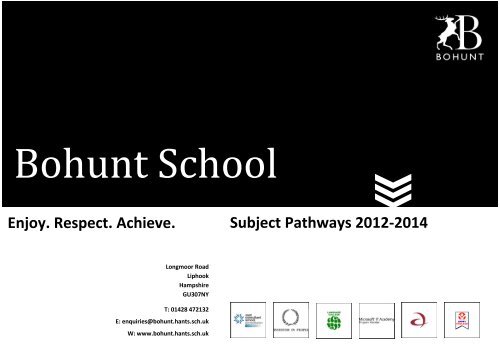
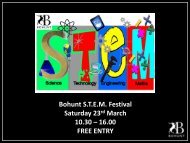
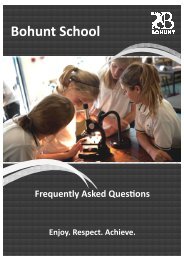
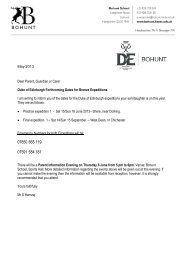
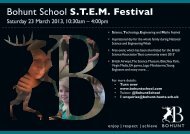
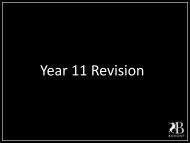
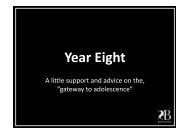
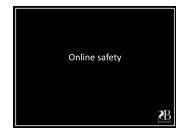
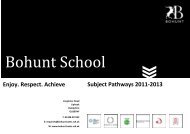
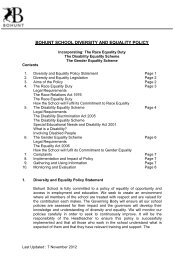
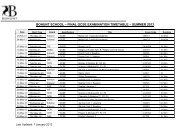
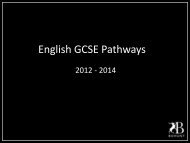
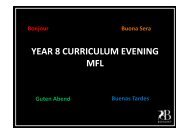
![English Language GCSE [Compatibility Mode] - Bohunt School](https://img.yumpu.com/40638660/1/190x134/english-language-gcse-compatibility-mode-bohunt-school.jpg?quality=85)
